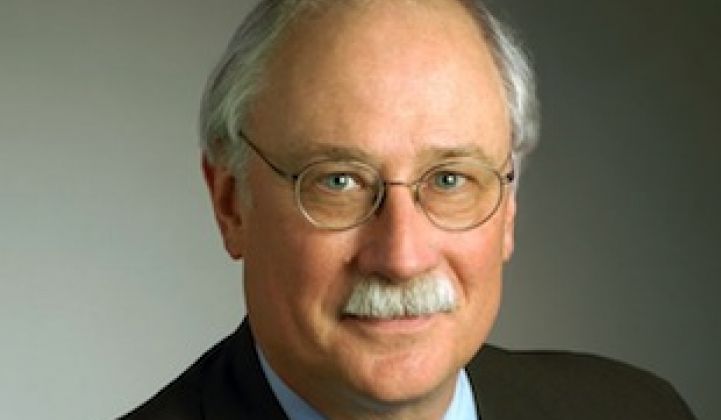Congress may not have many tools to stop President Obama's executive plan on climate, but they're doing everything they can to battle it where they're able: leadership at federal agencies.
After unsuccessfully attempting to stop the nomination of Environmental Protection Administrator Gina McCarthy, Republicans were able to derail Obama's nominee to lead the Federal Energy Regulatory Commission (FERC), Ron Binz.
In a statement released this morning, Binz announced he was stepping down as a nominee to run FERC, saying that his consideration was not "reported favorably by the Senate Energy and Natural Resources Committee."
"I plan to resume my consulting practice in Colorado, where my focus will remain on reform of regulation, the evolving utility business model, and how to move forward on a clean energy agenda," wrote Binz.
To supporters, Binz was a seen as a moderate progressive who would follow in the footsteps of outgoing chairman Jon Wellinghoff and help the energy sector embrace cleaner sources of energy. (In 2010, Greentech Media named Binz, who also founded the group Utilities 2020, as a top grid expert to watch on our Networked Grid 100 list.)
However, in the eyes of the fossil fuel industry and some Senate Republicans, Binz's own phrase "clean energy agenda" was a code word for "war on coal." Binz was heavily criticized by opponents, who painted him as an activist who would use his authority at FERC to stop construction of coal plants and pipelines for oil and gas.
Critics pointed to his five-year tenure as chair of Colorado's Public Utilities Commission, when he supported legislation phasing out 900 megawatts of old coal plants in the state and replacing them with renewables and natural gas. During his consideration in the Senate, Republicans also criticized his communication with a public relations firm promoting his nomination. Lisa Murkowski (R-AK), the ranking member of the Senate Energy and Natural Committee, pulled her support after emails were released by the Washington Times showing Binz talking with a public relations firm hired by an environmental organization, the Energy Foundation.
Speaking to Politico about his withdrawal, Binz hit back against his critics this morning.
“The caricature that they created had nothing to do with who I am and nothing to do with what I might’ve brought to FERC. It was just a blood sport,” he said. "Almost immediately, my appointment devolved into pretty raw, partisan and sectoral politics.”
The politics that ended Binz's confirmation process are unusual for a FERC nominee. The commission plays a major role in the regulation of America's energy infrastructure, but it has not been seen as a threat to the fossil fuel industry. However, with Republican lawmakers and lobbyists in the coal industry worried about the White House's wide-reaching plan to curb carbon emissions, Binz became a target for opponents looking for any opportunity to trip up the process.
Binz said he was not part of the administration's plan.
“I’ve never spoken to the White House about the climate action plan and I had no vision that FERC had a role in that, other than a very indirect one in the sense that FERC works to ensure access to energy markets from all resources,” he told Politico.
Now President Obama will have to go back to the roster of regulators to choose another nominee. It is likely he will choose someone already within FERC who will be easier to confirm.



